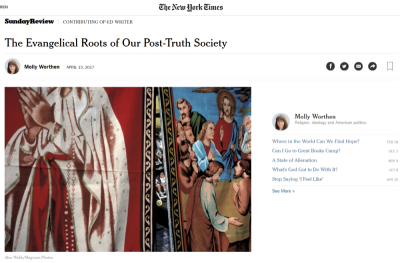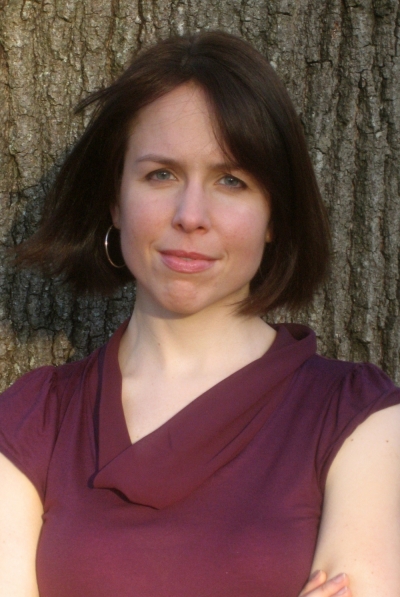Fake News: Are Evangelicals the Problem?

Our "post-truth" culture has its roots in evangelicalism, claims Molly Worthen in a New York Times op-ed, "The Evangelical Roots of Our Post-Truth Society."
Worthen, assistant professor of history at the University of North Carolina, Chapel Hill, begins, "The arrival of the 'post-truth' political climate came as a shock to many Americans. But to the Christian writer Rachel Held Evans, charges of 'fake news' are nothing new. 'The deep distrust of the media, of scientific consensus — those were prevalent narratives growing up,' she told me."

It's an interesting setup. The media is the bearer of truth, so distrust of the media contributes to a "post-truth" climate, Worthen reasons.
Worthen acknowledges that "evangelicals are not the only ones who think that an authority trusted by the other side is probably lying," but argues that evangelical mistrust is particularly worrisome because evangelicals believe the source of their authority, the Bible, comes from God.
The Christian worldview, she writes, "gets tangled up in the contradiction between its claims on universalist science and insistence on an exclusive faith."
Worthen contrasts that worldview with "the worldview that has propelled mainstream Western intellectual life and made modern civilization possible," which "revises its conclusions based on evidence available to everyone, regardless of their beliefs about the supernatural." This "Western intellectual" worldview "clashes with the conservative evangelical war on facts."

When I interviewed Worthen in 2013 about her book on evangelicalism, Apostles of Reason, I appreciated that she was genuinely interested in understanding evangelicals. But in this recent op-ed, she mostly perpetuates some of the worst evangelical stereotypes while ignoring the Leftists who actually fit the stereotype she ascribes to evangelicals.
I rarely read the viewpoint of an evangelical in The New York Times, unless one of us says something supportive of a liberal agenda, or something stupid. So reading in its pages that evangelicals are an obstacle to truth-seeking struck me as hypocritical. Honest truth-seeking welcomes viewpoint diversity.
In her 2013 CP interview, Worthen complained about the people who dismiss conservative Christian ideas as "irritable mental gestures" rather than "serious parts of the Western intellectual tradition." Yet now, Worthen separates evangelical thought from the Western intellectual tradition and calls it dangerous. Evangelical "cynicism and tribalism" are "dangerous," she concludes, because "they pose as wisdom and righteousness."
It's refreshing to find secular sources finally concerned about truth, now that Donald Trump is president. But blaming evangelicals, who've been fighting the "truth is relative" concept in America for over 100 years, is misplaced.
The term "fake news" first came from liberal news sources, who used the phrase as an explanation for why Hillary Clinton lost the presidential race. Trump and some conservatives then stole the phrase, using it to complain about biased media coverage. So now, in another switch, those who complain about "fake news," or biased journalism, are associated with post-truthiness.
When it comes to the search for truth, evangelicals aren't the main problem when looking at all that is going on in America today.
Whose "righteousness" is more "dangerous" to "Western intellectual life": the evangelicals who respectfully heard Bernie Sanders speak at Liberty University, or the Middlebury College social justice warriors who put a professor in the hospital?
Who said, "The idea that there is a single truth — 'the Truth' — is a construct of the Euro-West that is deeply rooted in the Enlightenment, ...."? Not evangelicals. It was Pomona College Leftists who denied the extistence of truth and decried the Enlightenment.
While every tribe has its miscreants, by and large, evangelicals welcome an honest search for truth and the civil dialogue necessary for that to happen.
When J. Warner Wallace, a cold-case detective, approached cable networks about a TV series on the evidence for the existence of Jesus, using the tools of a cold-case detective, the secular networks were uninterested.
"In the end, shows that make a case against Christianity, or even shows that present the 'mythological' stories of the Bible, are welcome," Wallace notes. "Shows that take an evidential approach and argue for the truth of the Gospels and the Deity of Jesus, are not."
When evangelical Ryan Bomberger debated abortion on a radio show, the pro-choice side offered emotional appeals while Bomberger spoke about facts and evidence, when he wasn't being cut off from speaking by the moderator. The Planned Parenthood spokesperson originally scheduled to be on the show backed out after she learned it would be a debate with Bomberger.
Evangelicals are indeed fighting to be heard in the cultural centers of Hollywood, the media and academia, but there is nothing dangerous about seeking a seat at the table.
Secular progressives, on the other hand, are the ones behind government-mandated speech in California, Hawaii and Canada: "safe spaces" that shut down viewpoints the leftist mobs disagree with, including the viewpoints of some fellow liberals; the blacklisting and misrepresentation of ex-gay evangelical views on Vimeo and ABC; and, the resignation of climatologist Judith Curry from Georgia Tech after she realized she couldn't honestly seek the truth in her position there.
So please, let the search for truth continue. Evangelicals welcome it.






















